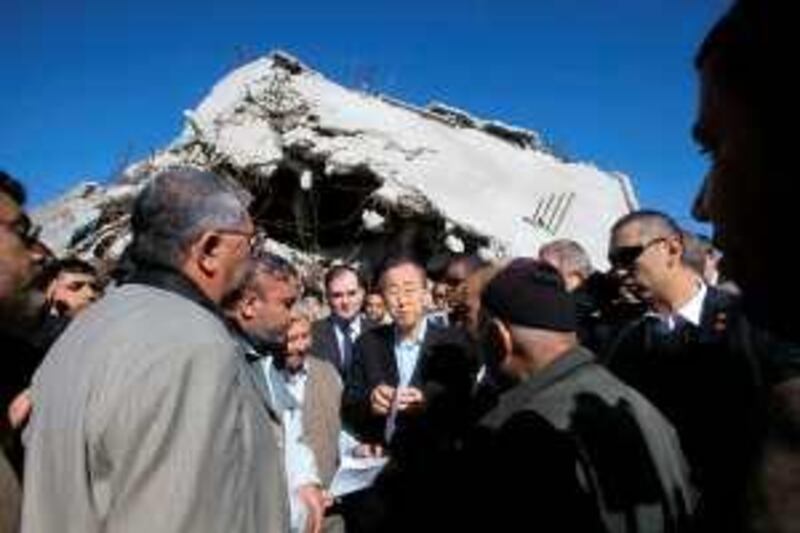GAZA CITY // Ban Ki-moon arrived in the Gaza Strip yesterday for a trip the UN secretary general said was aimed at expressing solidarity with the people of Gaza and amid a larger diplomatic push this week for the resumption of peace talks between Palestinians and Israelis. "I came to express solidarity with the people of Gaza; we stand with you," Mr Ban said at a press conference in the southern Gaza Strip town of Khan Younis. "I have repeatedly made it quite clear to Israel's leaders that the Israeli policy of closure is not sustainable and that it's wrong. It causes unacceptable suffering."
Mr Ban first visited the Gaza Strip just days after Israel halted its devastating 22-day military offensive on the territory 14 months ago. At the time, a visibly angry Mr Ban described as "outrageous, shocking and alarming" the widespread destruction brought by the assault. He condemned an "excessive" use of force by both Israel and Hamas during the war, and called for a full inquiry into the conflict.
But more than a year later, the Gaza Strip has so far been unable to rebuild, with thousands of homes and vital infrastructure still damaged or destroyed by the war. Israel had sealed the enclave's borders to all commercial imports and exports, including critical construction materials, after the Hamas movement seized power from its secular rival, Fatah, in Gaza in 2007. Mr Ban was here to inaugurate the completion of the construction of 150 housing units built by the UN for Gazans who lost their homes in previous Israeli offensives. He said Israel agreed to allow the import of necessary building materials - including a limited amount of cement and windowpane glass - through the UN to finish the homes, but that the project was just a "drop of water in the bucket".
"There are still 60,000 families who are without proper housing in Gaza," said John Ging, director of UNRWA, the UN Relief Works Agency in Gaza, who was also at the press conference. "We are very pleased the secretary general was able to come and see personally the situation, but opening the borders and lifting the siege, those are the keys. This is a blockade on legality and, you can say, on humanity here in Gaza."
The secretary general's visit, his second to the Gaza Strip, also came on the heels of a fresh round of violence in the embattled enclave. Citing the continued construction of Jewish settlements in Arab neighbourhoods of East Jerusalem, which Palestinians claim for a future capital, Palestinian militants in Gaza fired a rocket into Israel that killed a Thai migrant worker on Thursday. Israel's housing ministry announced two weeks ago the construction of 1,600 new Israeli homes in East Jerusalem, sparking a diplomatic row with the United States and scattered Palestinian protests throughout East Jerusalem and the West Bank.
Israel responded to the rocket fire from Gaza with a series of air strikes across the territory on both Thursday and Friday night, in which at least 12 Palestinians were injured, according to local medics. On Saturday, just hours before Mr Ban's visit yesterday, Palestinian fighters launched four more rockets into Israel, causing no damage or injuries. Speaking in Gaza, Mr Ban urged Palestinians in the territory to "choose the path of non-violence, Palestinian unity and international legitimacy", adding that Israel's blockade "weakens moderates and strengthens extremists".
He also called for resuming negotiations on an Israeli-Palestinian prisoner swap, which would see a captured Israeli soldier, Gilad Shalit, released after three years in captivity in exchange for 1,000 Palestinian prisoners in Israeli jails. While armed Hamas policemen lined the main roads on which Mr Ban's convoy travelled yesterday, the UN chief did not meet with leaders from the Islamist government here.
"We appreciate very much Mr Ban Ki-moon's efforts, and the efforts of the international community, to change the situation here and in the West Bank," said Hamas's undersecretary of political affairs, Ahmed Yusuf. "We are grateful for his visit and hope that these diplomatic efforts will translate into something fruitful on the ground." Mr Yusuf added that the recent statements issued by the Quartet - the United States, United Kingdom, Russia and European Union with whom Mr Ban met with last week in Moscow - were also welcomed by the Hamas government in Gaza as positive developments towards what he calls "Israeli aggression" against Palestinians.
The Quartet demanded on Friday that Israel halt all settlement building in East Jerusalem and the West Bank. Hamas itself, since it won Palestinian legislative elections in 2006, has also been put under strong pressure from the Quartet to recognise Israel and adhere to agreements previously signed between Israel and the Fatah-led Palestinian Authority in Ramallah. Hamas rejects outright direct negotiations with Israel, and has accused Fatah, which controls the West Bank, of collaborating with Israel to strangle Palestinian resistance.
But in response to the recent rocket fire from Gaza, Mr Yusuf said his government has a moral duty to allow Palestinians to take action from Gaza against "Israeli provocations" in Jerusalem. "Hamas cannot control someone who has been outraged because of the Israeli provocations in Jerusalem," Mr Yusuf said. "Nobody will able to stop the Palestinians from expressing their anger." foreign.desk@thenational.ae





